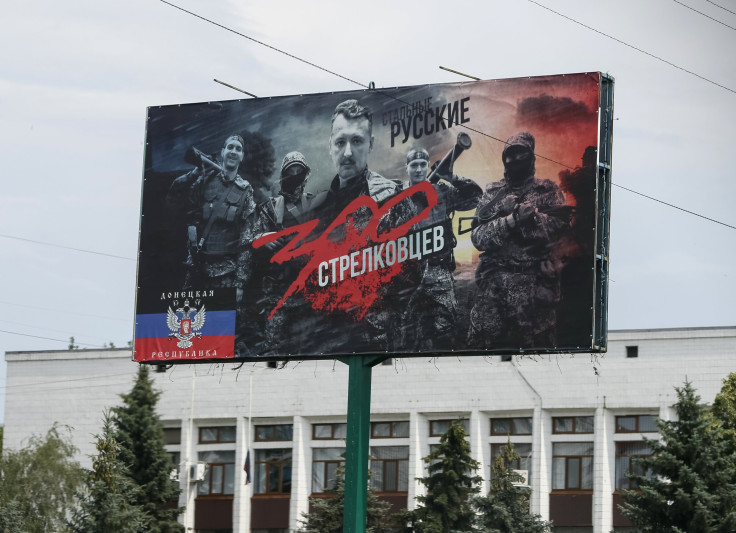Who Is Igor Strelkov? Russians Love Reenactor Turned Rebel Commander Who Delivered Bizarre, Racist Press Conference

Igor Strelkov, the retired Russian military officer turned separatist leader who is widely believed to be responsible for the missile attack that shot down Malaysia Airlines flight MH17, delivered a bizarre, impromptu press conference Monday in which he denied firing on the commercial jet but bragged of murdering Africans living in the occupied region of Ukraine.
Strelkov, aka Igor Girkin, is the shadowy leader of the Donbass People’s Militia paramilitary group (multiple outlets have reported that he’s also involved with the Donetsk People’s Republic). He previously told reporters he was a military intelligence general and served in the FSB, the Russian security service that has a foundation in the KGB, until March 2013. He’s also believed to have been one of the key figures in the 1992 Serbian ethnic cleansing of Muslims in eastern Bosnia, a massacre that claimed the lives of at least 3,000 women, children and elderly people.
It’s these Russian ties, and a hobby of dressing as a Russian war reenactor, that has made Strelkov such an irresistible figure to the international media. Oleg Kashin, writing in the New Republic, explained Strelkov has become kind of a hero in Russia for his role in the ongoing crisis, with Russians observing the unrest as an “epic drama involving imperial ambitions, business interests, history, geopolitics and warfare.”
“He has, perhaps, more fans in Russia now than any politician of the older generation, of whom the Russian television viewer has long grown weary,” Kashin wrote. “Putin needed Strelkov in order to rattle the new Ukrainian authorities. Thanks in part to him, part of the Ukrainian territory has remained volatile, and this has allowed Putin to claim that Kiev is not in control, that Ukraine’s revolution is a dead end.”
Strelkov’s sensational place in the conflict was on full display in the surprise six-minute press conference Monday. Western journalists reporting from the scene made it clear the environment was unfriendly, with Max Seddon, a foreign affairs correspondent, announcing on Twitter the rebels were only allowing media outlets with ties to the Kremlin inside.
Tweets published during the news conference built on the public’s knowledge Strelkov has an affinity for Russian history. The New Republic noted Strelkov is known to be obsessed with Mikhail Drozdovsky, a general of the doomed White Guard that fought in the Russian Civil War (1917-22).
“Before he became a military star in Ukraine, Strelkov was already a star among war reenactors. These men arm themselves with old weapons, dress in military uniforms, and gather in deserted places to act out long ago battles,” TNR explained. “Essentially, [Strelkov] is now playing the same role in Ukraine: His haircut, his mustache, his manners and even his military tactics are almost all copied from images of White Guard officers in Soviet films.”
Portrait outside Strelkov's office. pic.twitter.com/k8SytDHVPd
- max seddon (@maxseddon) July 28, 2014Instructions from the Ministry of Defense of the USSR. pic.twitter.com/da5emXF3ic
- max seddon (@maxseddon) July 28, 2014Dressed in a camouflage shirt and wearing his signature mustache, Strelkov reportedly denied that his militia was in control of a Buk missile system that U.S. intelligence forces believe shot down the plane nearly two weeks ago, killing all 298 people on board. He was also asked about Igor Bezler, the separatist commander heard on an audio recording discussing the missile 20 minutes after the crash.
Strelkov asked about rumors psychotic commander Igor Bezler has fled Horlivka. Refuses to comment.
- max seddon (@maxseddon) July 28, 2014He went on to reiterate claims from previous Russian leaders that the Ukrainian military is responsible, either directly or otherwise, for firing the rocket that brought down MH17. Kremlin-backed militias are widely believed to have shot down the plane with Buk missiles supplied by the Russian military and have drawn international condemnation for their treatment of the crash site and willingness to use violence there in the weeks since.
Strelkov says Ukrainian army used "an unexpected amount of artillery today, even for me." pic.twitter.com/lRAkOsJk7n
- max seddon (@maxseddon) July 28, 2014Igor #Strelkov Defense minister of separatist fighters in rare press appearance says not losing against #Ukraine pic.twitter.com/BjPgNGZNQC
- Jennifer Glasse (@JenniferGlasse) July 28, 2014Weirdest moment of six-minute Strelkov presser was when he claimed rebels had killed mercenaries "of the negroid race." But it was all weird
- max seddon (@maxseddon) July 28, 2014That Strelkov has been charged with terrorism by the government of Ukraine has only boosted his reputation in Russia. Public billboards, social media posts, and tribute websites have surfaced comparing Strelkov to the Spartan solders in the movie “300” and Brad Pitt’s Tyler Durden character in “Fight Club.” Russians have also donated tens of thousands of dollars to the rebel cause, although pundits have warned that its this very popularity that could make Strelkov vulnerable to Moscow’s insecurities.
“It has already been said that the new Russian generation is not ‘Putin’s generation,’ but ‘Strelkov’s generation,” Russian nationalist Egor Prosvirin told the Moscow Times, adding that “rebels are heroes for the absolute majority of the Russian population.”
© Copyright IBTimes 2024. All rights reserved.











